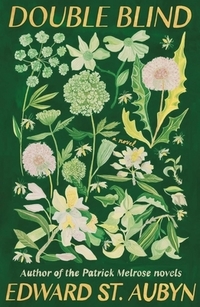Double Blind by Edward St. Aubyn
 Monday, May 31, 2021 at 7:22AM
Monday, May 31, 2021 at 7:22AM 
Published by Farrar, Straus and Giroux on June 1, 2021
Philosophy, genetics, and mental illness are the building blocks of Double Blind. They rest on the foundation of family, the anchor of all Edward St. Aubyn’s work.
If it is about anything, Double Blind is about relationships. Nature is the setting that informs those relationships — in particular, a country estate called Howorth that has been given over to wilding. If we lived in a state of nature like the deer in Howorth, copulating freely and without attachment might be the natural thing to do. Perhaps it is the natural thing for humans to do when they are not in a relationship, but after relationships form, natural behavior could be too destructive to contemplate. That’s the philosophical question that confounds Francis, whose job is to give tours of Howorth while monitoring the resurgence of species.
Francis’ girlfriend is a biologist named Olivia. Notwithstanding Olivia’s pregnancy, Francis is tempted by Hope’s repeated offers of sex, beginning when they swim together in the nude. Nudity should be natural for Francis. He’s a naturalist who is restoring the cultivated fields of Howorth to their natural state. Nudity seems to be Hope’s preferred state — she sheds her clothing whenever she’s alone with Francis — making temptation, in the form of “grasping at Hope,” a force of nature that Francis struggles to resist.
Another key relationship involves Olivia’s friend Lucy Russell, whose bright future is threatened by a brain tumor. A venture capitalist and fund manager named Hunter Sterling persuaded Lucy to move to London and run a venture capital firm that focuses on science and technology. Since the offer gave Lucy an excuse to leave her rich American boyfriend, not much persuasion was needed. Lucy agrees to stay in Hunter’s London flat while she’s getting situated. Hunter is usually elsewhere, indulging in his cocaine-fueled life of megalomania. Hunter’s “love of power and money had acted as a proxy for love itself” until Lucy gave him cause to alter his perspective.
The final relationship of importance involves Olivia’s adoptive father. Martin Carr is a psychotherapist whose fascination with a schizophrenic patient named Sebastian pushes him toward his ethical boundaries when he begins to suspect that Sebastian, who was also adopted, might be related to Olivia.
An odd but amusing subplot involves the Catholic Church’s relationship with Lucy and Hunter. Lucy is developing a project called Brainwaves. The project scans the brains of people who are in a desirable state of mind and attempts to reconstruct those states in others using trans-cranial magnetic stimulation. A Cardinal has tasked a Franciscan Abbot named Father Guido with making money from a brain scan of “the greatest mystic of modern time.” Using Brainwaves technology, the church plans to market a helmet that will stimulate the mystical centers of the brain by replicating the mystic’s brainwaves. Father Guido provides some comic moments as encounters and inadvertently enjoys a world that is foreign to his ascetic life.
When St. Aubyn isn’t developing relationships, his characters indulge in far-ranging discussions about the mind and the natural world. They talk about mental illness and genetics, the efficacy of psychotherapy, the relationship between socioeconomic status and the mental health diagnosis one is likely to be given, theories surrounding the development of consciousness, the nature of science (“Science is a subset of human nature and not the other way around,” Hunter opines), the tension between determinism and freedom, and the potential of immunotherapy as a cure for cancer. St. Aubyn advances a number of interesting thoughts, including the semantic use of “side effect” to “pretend that among the range of pharmaceutical effects caused by a medicine the undesirable ones were somehow incidental.” I also liked the notion that “experience accuses science of being reductionist and authoritarian, while science dismisses experience as subjective, anecdotal, and self-deceived.”
St. Aubyn tosses out dozens of well-formed thought pearls, many of which would make intriguing essays, but can they sustain a novel? The plot scatters its threads, never weaving them into a tight story. Digressive paragraphs about population biology and genetics go on for pages, interrupting any momentum toward telling a story.
The characters generate enough family drama to sustain two or three novels, but the drama gets lost in the swirl of ideas that St. Aubyn uses as a substitute for storytelling. The plot eventually reaches what seems like an arbitrary stopping point, leaving every thread dangling. The result is disappointing. Working intellectual intrigue into a plot is always welcome, but not at the expense of abandoning the plot, as if the writer realized that none of the stories he started were really worth telling.
And maybe they aren't. Francis' potential affair is hardly groundbreaking fiction, while Martin's therapeutic relationship with a possible relative of his adopted daughter seems a bit contrived. The Brainwaves subplot seems better suited to a science fiction comedy. Maybe St. Aubyn decided to plow all the plot threads under and let the story grow as a wilding in the reader's mind. Only the hapless Abott struck me as an original character, but St. Aubyn has enough talent to have grown his other story fragments into a literary garden if he had set his mind to it.
RECOMMENDED WITH RESERVATIONS
Reader Comments